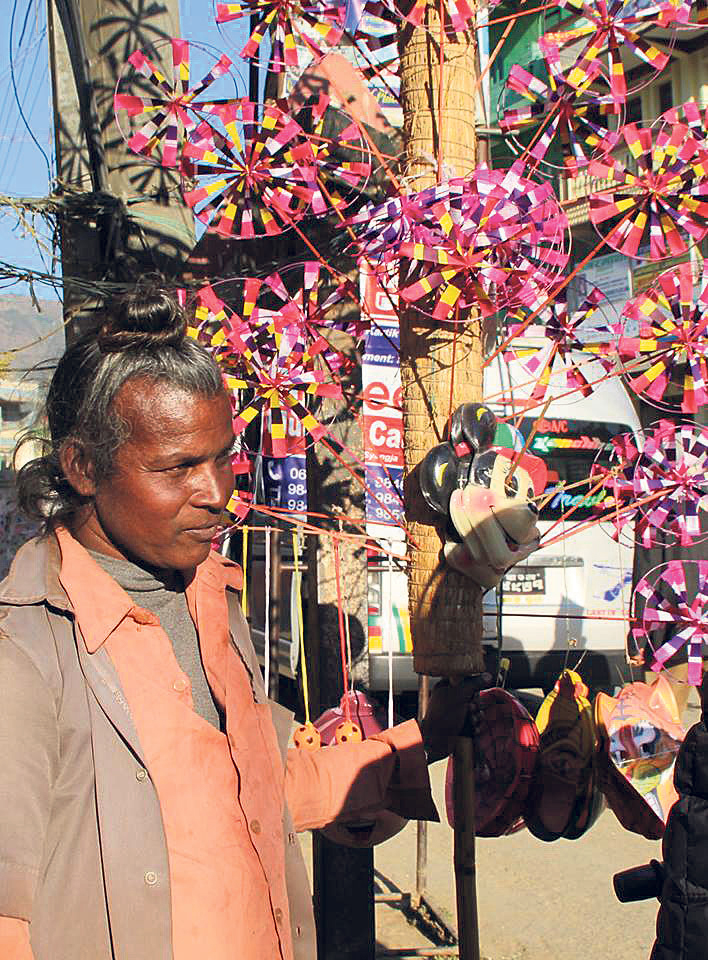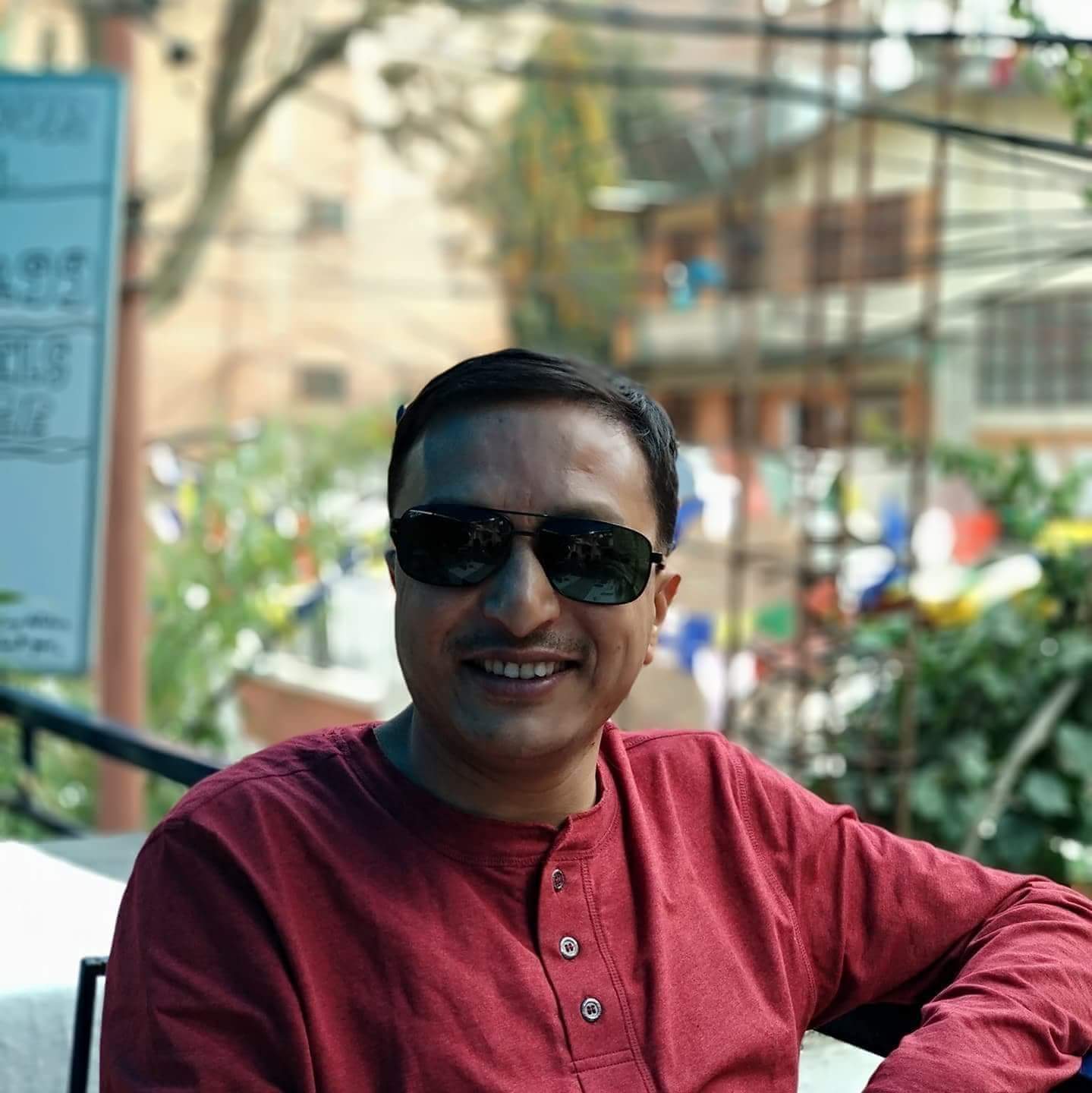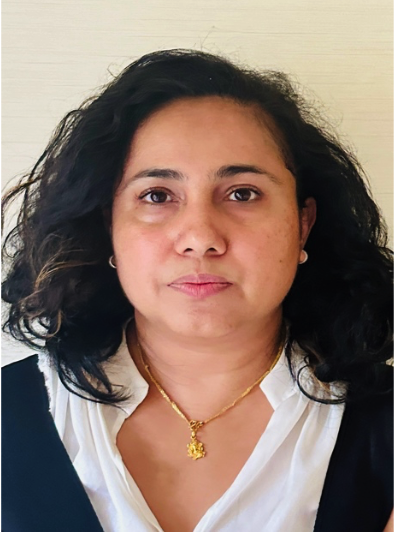His complexion, his demeanor, his strange attire, everything about him pointed to an interesting story
‘Kaha se hain aap?’ I asked him after a while, in Hindi, about his place of origin.
I was travelling to Waling (in Syangja district) from Pokhara. Putalibazar Municipality, popularly known as Syangja Bazar, is midway between Pokhara and Waling. He had boarded the bus there.
His complexion, his demeanor, his strange attire, everything about him was pointing to an interesting story. He was struggling to move with his load of colorful stuffs in the narrow alley inside the bus.
No limitation to beauty

 The Author
The Author
At first glance, in this hilly hinterland of Nepal, he looked different because of his color. He could be a Madheshi, or an Indian from Bihar or UP.
I had straight away assumed that the conductor would talk to him with an unwarranted authority; he may even insult him. Or worse, he may even be manhandled. And I had started devising a strategy on how to deal with a situation like that, if it actually occurs.
When a colorful firfire (pinwheel) got stuck and sat on the head of one of the passengers—a woman who looked to be in her mid-20s—I thought that the situation I was preparing for silently has arrived. But, he managed—with his smile, a soft tone, broken Nepali and easy body language—to subterfuge the irritation and even got a friendly chuckle from other passengers.
He offered the ‘toy’ to the lady after plucking it from her hair. She gladly accepted it and said ‘thank you’ for the free gift.
I did not have to choose between the two strategic plans I had devised—either intervene mildly and save him from trouble or be a passive observer and write about it strongly later. I was mildly disappointed but I was also extremely happy.
When he was struggling to adjust on the seat across, I instinctively stretched my arms to balance the strange setup he was carrying. I realized it was made by wrapping a straw mat around a bamboo stock. Small pikes were stuck on the mat. It was like a tower with colorful windmills jutting out from the wall.
Together, with him, it was beautiful.
He smiled. Up close, I observed, he did not look like a regular Madheshi or an Indian from UP or Bihar. And that is when, I asked him, about his place of origin.
“I come from far, very far, Bade Bhai,” he said, addressing me as the respected ‘elder brother’ despite evidently being older than me, “From India.”
“Where in India?” I asked in a tone almost hinting that I was struggling to not add ‘that’s so obvious!’ And I regretted it the moment I heard myself.
“I am from Deogarh, in Jharkhand, Prabhu,” he said in the same soft tone, and this time addressing me as ‘Prabhu’, which, in rough translation means Master or even Lord.
A lot of things unfolded suddenly. His face was almost friendly now. He resembled the aborigines, the Adivasis, from Jharkhand. I had done my schooling, for five years, in Ranchi, the capital of Jharkhand. Hearing about Jharkhand, and meeting someone from there was nostalgic for me.
But it was also deeply intriguing for me to meet Tapan Basak, from the Indian state of Jharakhand, alone, in Syangja. That is far, very far. He said he had come to Pokhara for the fair. I was curious to know whether he carried all the raw material from Jharkhand. He said he did.
“I am coming to Waling after almost five years. It must have changed. Towns in Nepal change so quickly, within years.” He reflected, almost with nostalgia. In the conversation that followed, he told me that he has been travelling to different places in Nepal since last twenty years, selling toys for children.
“Nepal is my ‘Karma Bhoomi! I am a Vaishnav, Prabhu,’ I don’t lie, not even a single word,” he said, showing me the necklace of Tulasi beads he was wearing, and pointing at his uncut hair nicely bundled on his head, “I have fed my family, built a house and built a Krishna Temple in my village from what I earned here, in Nepal. Every year, on Krishna Ashtami, we feed around a thousand people in that temple. All I got in my life is from Nepal. This land has been kind to me. Lord has been kind to me. ”
“Don’t people trouble you? What is the difference between people here and there?” I try to bring him down to talk about more earthly things, about people.
“Here, in Nepal, even poorest of the poor can earn enough if they work hard. It’s not so easy for poor people in India. It’s tough. It’s really tough.”
I could make out he ignored my first question. And I was left wondering how much of his answer to the second question was influenced by the hidden expectation of the audience.
But, I could sense strongly, he felt at home in Nepal.
Twitter: @dn_ktm






































